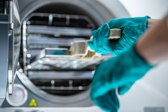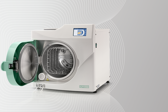Categories
Most Recent
Adapting to the new normal
7th Dec 2020 in Dental, Animal Health, HealthcareEschmann speaks to Zoe Pollard, Spa Manager and Treatment Coordinator at Black Swan Dental Spa, about how infection control protocols have changed in practice as a response to the pandemic.
Everyone working in the dental profession will be aware that the Coronavirus pandemic has brought substantial change in the industry. Practices have had to adapt to government guidelines and approach infection control in a different way in order to ensure they are keeping patients and staff safe.
Zoe Pollard explains how these changes have impacted daily workflows and patients during this time:
'I think the biggest changes to how we approach infection control are, of course, that we now have even more strict government guidelines to follow. The introduction of the fallow period between appointments was difficult to adjust to at first, but we've recently installed air extractors in each of our treatment rooms so that we can reduce the time between appointments to just 20 minutes. This has been really helpful.
'We've also invested in some new products to clean treatment rooms between patients, and we have adopted a more intensive approach to ensuring our infection control remains faultless. We now not only wipe down surfaces but use chlorine tablets to help guarantee that all pathogens are successfully eliminated. We've had to simplify our spaces - de-cluttering the shelves and removing items from the practice that could potentially become contaminated - it's much easier to clean this way!
'As well as implementing the necessities, we've gone a step further to ensure that safety remains our number one priority for patients and staff alike. We've introduced stringent social distancing measures in our waiting rooms and we encourage patients to arrive at the time of their appointments so that waiting time is minimised as much as possible. We've also ensured that hand sanitiser is readily available for anyone visiting the practice and that patients are screened with temperature checks before they enter - basically we're taking every precaution possible to ensure that people feel safe and at ease when they come and see us.'
Of course, these changes have made a big difference for both patients and professionals in the practice. Zoe explains how patients have reacted to these new measures:
'We've mostly had a very positive response to these measures, especially as patients can see that they are in place designed specifically to keep them safe. However, we've seen a huge rise in patient numbers over the last few months as we are taking in a lot of referrals and it has been tricky to balance seeing everyone with the new guidelines. The enhanced PPE we are wearing has also made communication slightly difficult and treatment more daunting for patients, but I think 99% of them completely understand why these measures are necessary and are willing to accept these in order to get the care they need.
'Another change we made was the transition to paperless systems. This has been a difficult learning curve for some of our older patients, but it's been a necessary step to ensure that people remain as safe as possible.
'We've mostly had a very positive response to these measures, especially as patients can see that they are in place designed specifically to keep them safe. However, we've seen a huge rise in patient numbers over the last few months as we are taking in a lot of referrals and it has been tricky to balance seeing everyone with the new guidelines. The enhanced PPE we are wearing has also made communication slightly difficult and treatment more daunting for patients, but I think 99% of them completely understand why these measures are necessary and are willing to accept these in order to get the care they need.
'I don't think it's unrealistic to expect that some of these processes will stay in place even after we've gotten used to the "new normal". I think hand sanitiser for patients and other measures that help prevent the spread of infections will become standard, but I do think the more drastic protocols such as the fallow periods will have to be removed, especially to cope with higher patient demand.
'Throughout the pandemic, it's been a real asset having our SES2010 and SES 3000B autoclaves from Eschmann. These units are both really reliable and fast, which helps us cope with the demand during extremely busy periods or when we have items such as implant kits that need to be sterilised. The large capacity of the 3000B, in particular, has been hugely helpful, and having these units has really lessened the strain on our staff during these challenging times.
'At the end of the day, infection control has had to evolve in order to meet the threats of the pandemic and to keep patients and staff safe. Big changes are always going to take some getting used to, but I think more and more practices are adapting and are starting to operate on a more normal basis, which is great!'









